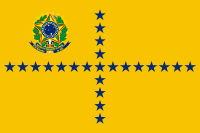Café Filho
| His Excellency Café Filho GCTE | |
|---|---|
 | |
| 18th President of Brazil | |
|
In office 24 August 1954 – 8 November 1955 | |
| Vice President | None |
| Preceded by | Getúlio Vargas |
| Succeeded by | Carlos Luz |
| 13th Vice President of Brazil | |
|
In office 31 January 1951 – 24 August 1954 | |
| President | Getúlio Vargas |
| Preceded by | Nereu Ramos |
| Succeeded by | João Goulart |
| President of the Federal Senate | |
|
In office 31 January 1951 – 24 August 1954 | |
| Preceded by | Nereu Ramos |
| Succeeded by | Marcondes Filho |
| Personal details | |
| Born |
February 3, 1899 Natal, Rio Grande do Norte, Brazil |
| Died |
February 20, 1970 (aged 71) Rio de Janeiro, Guanabara, Brazil |
| Nationality | Brazilian |
| Political party | Social Progressive |
| Spouse(s) |
Jandira Carvalho de Oliveira (m. 1931–1970) |
| Children | Eduardo |
| Profession | Journalist • lawyer • politician |
| Religion | Presbyterian |
João Fernandes Campos Café Filho GCTE (Portuguese: [ˈʒuɐ̃w feɾˈnɐ̃dis ˈkɐ̃pus kaˈfɛ ˈfiʎu]; February 3, 1899 – February 20, 1970) was a Brazilian politician who served as the 18th President of Brazil, taking office upon the suicide of former President Getúlio Vargas. He was the first Protestant to occupy the position.
Biography
Café Filho, a lawyer, was born in Natal, Rio Grande do Norte, February 3, 1899. He was the founder of the Jornal do Norte (1921), editor of the O Correio de Bezerros in the city of Bezerros, Pernambuco (1923), and director of the newspaper A Noite (1925), writing in the latter, articles in which he asked soldiers, corporals and young officers to refuse to fight the so-called "Coluna Prestes", which resulted in his conviction to three months in prison. He then escaped to Bahia in 1927, under the name of Senílson Pessoa Cavalcanti, but eventually returned to Natal, where he surrendered. In 1923, he ran for alderman in Natal, but failed.
He joined the Liberal Alliance and was one of the founders, in 1933, of the Social Nationalist Party of Rio Grande do Norte (PSN). Café Filho was elected federal deputy (1935-1937) and stood out for the defense of constitutional liberties. Threatened with arrest, sought asylum in Argentina, returning to Brazil in 1938. He founded, along with Ademar de Barros, the Progressive Republican Party (PRP), for which he was elected federal deputy again (1946-1950). Elected vice president by a coalition of parties that merged under the symbol Progressive Social Party (PSP), he assumed the presidency with the suicide of Getúlio Vargas, August 24, 1954.
Presidency
Café Filho assumed the presidency immediately after the death of Getúlio Vargas. In his new cabinet, he had as minister of finance the economist Eugenio Gudin, supporter of a more orthodox economic policy, which sought to stabilize the economy and combat inflation. The Minister adopted as key measures to contain credit and cutting public expenditure, seeking thereby to reduce the public concerned deficit in its assessment of the inflationary process. During the Café Filho government, was instituted the single tax on electricity, generating the Federal Electrification Fund, and the withholding tax on income from the labor wage. Stood out yet in his administration the creation of the Committee on Location of the New Federal Capital, the inauguration, in January 1955, of the Paulo Afonso hydroelectric plant and encouraging the inflow of foreign capital in the country, which would influence the process of industrialization that followed.
Temporarily removed from the presidency on November 3, 1955, due to a cardiovascular disorder, on November 8 he was replaced by Carlos Luz, the president of the Chamber of Deputies. Recovered, Café Filho tried to reassume presidential powers, but his removal was approved by the Congress on November 22, 1955 and confirmed by the Supreme Court in December.
The average growth rate of the Brazilian economy under his administration was 8,8%.
Post-presidency
After the presidency, Café Filho was appointed minister of the Court of Accounts State of Guanabara (1961-1970).
He died in Rio de Janeiro on February 20, 1970.
References
- Biography and Presidency of Café Filho
- The History of the Chamber of Deputies
- Average GDP growth: Vargas - Rousseff
External links
| Wikimedia Commons has media related to João Café Filho. |
| Political offices | ||
|---|---|---|
| Preceded by Nereu Ramos |
Vice President of Brazil 1951–1954 |
Succeeded by João Goulart |
| Preceded by Getúlio Vargas |
President of Brazil 1954–1955 |
Succeeded by Carlos Luz |
